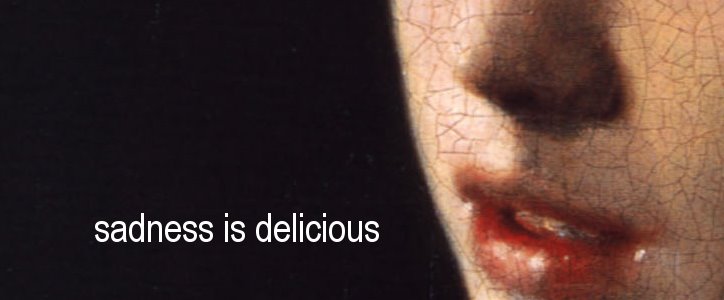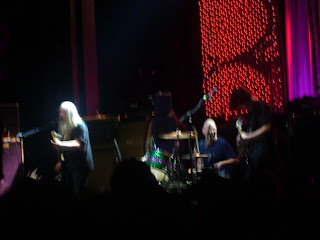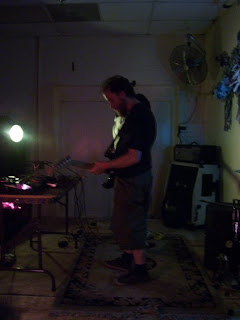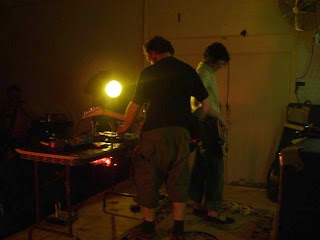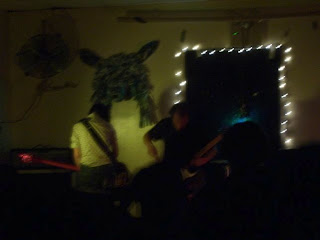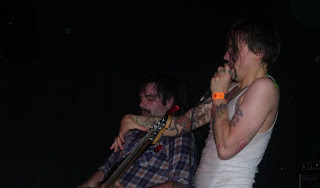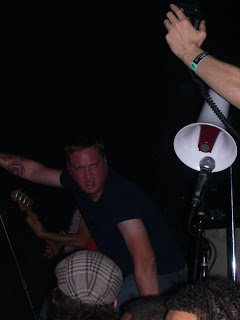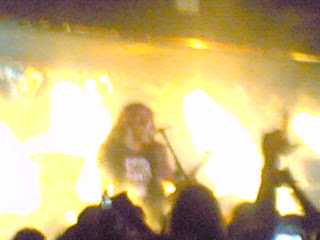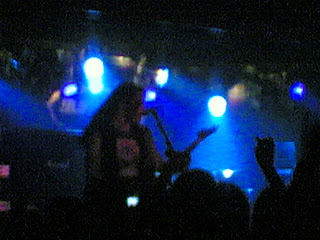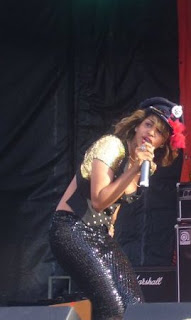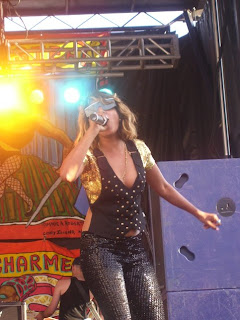XASTHUR INTERVIEW... HIS LAST?
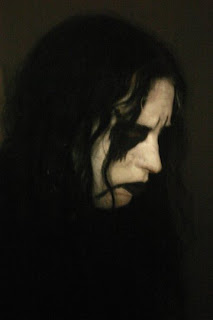
Since 1995, a man who goes by Malefic has created noisy, minimalistic black metal soundscapes by himself with his group, Xasthur. With murky tones, repetitive motifs and almost instrumental-like vocals, it ranks among the most introspective yet scary music I've ever heard. Although he contributed to Twilight, a collective of US-based black metal musicians, which he recently departed (to be replaced by Isis vocalist/guitarist Aaron Turner), and has contributed to the groups Sick (US) and Mord (US), as well as vocals for SunnO)), he is music sounds like the work of an isolationist. Often, he has used drum machines, which gives his music even more of a less-human sound. For his latest album,
Defective Epitaph (Hydra Head), he expanded his musical instrumentation to include cello and live drums.
Earlier this year, Malefic answered some questions I had for a feature I was writing for CMJ. He wanted the original, unexpurgated interview to appear so he could not be misquoted, which I completely understand. At the end of this interview, he says that it will be his last, but only time will tell if that's not the case. Nevertheless, in this interview, done via email, he is candid, thorough and witty. I especially like his
Pumping Up With Hans & Franz reference near the end (or maybe I'm missing something). Nevertheless, it was an honor to do an interview with Malefic.
Why are you including drums and cello on your forthcoming album? Will you be playing the instruments?Yes, the drums and cello have been performed by myself. It’s time to try different things, to get a different sound and to present a challenge to myself and anyone else who might be listening. To be specific enough, at least five of the songs will have real drums and three will have cello. I’ve gotten something unexpected out of the cello. It not only came across sounding more eerie in the music, but it simultaneously comes across with this slight industrial drone/undertone, so it’s catching my interest in many ways.
Other than flaky musicians, why do you feel it’s hard to collaborate with others on your music?I don’t think that I would be able to convey to another person what I’m trying to do or to explain it. Also, I don’t think of myself as a very good musician. I don’t “shred” on the guitar, for example, but I have many ideas, and this is the strength in what I do. But I’m not so “technical,” which is the weakness. I’m better at writing music and recording it myself than I am playing it with others, and this is one of the reasons why my “collaborations” don’t last for very long. Being on my own is what has worked best, but the future might have something else in store.
I’ve read that you played in death metal groups in the ’90s, and I figure it was a natural progression, but what originally attracted you to black metal?Yes, I did temporarily until I became sick of the death metal scene. All around me, it was starting to become a party scene with the same mentality. There was plenty of “gore” behind it, but once the shock value wore off, I realized that there was nothing dark, deadly or hateful about it. And it became something urban and was something I grew out of.

Once I discovered black metal, the transition came naturally, and it was more in tune with the way I felt and looked at life. Many years ago, I viewed black metal as the opposition and adversary to everything, including death metal, thrash, head-banging heavy metal and also things like life, love, society and hope. Unfortunately, I’m beginning to see black metal turning into the opposite of what drew me to it in the first place, which I’ll admit is hard to deal with, but I will deal with it soon enough by just letting go. Being “into something” doesn’t mean a fucking thing to me.
I don’t care about many death metal bands of today, but sometimes I still listen to some bands from a special era like Sepsism, Demilich, Shub Niggurath, Hardware (Mex), Autopsy and Rottrevore for old times’ sake.
Xasthur has a very different sound from more traditional black metal groups, it’s more morose. What do you feel separates your music from Scandinavian bands or other more-traditional groups?There is a lot more of a funeral doom influence in the music I create. It’s not strictly winter-y and majestic black metal. Being untraditional is about the only thing that sparks my interest anymore.
You’ve previously expressed an interest in possibly doing a non-metal album, something more symphonic. Who are your primary non-metal influences?This is an option that I consider, but I would want the sounds and ideas to be endless. With black metal, the possibilities are many but not endless. So far, I haven’t depended on keyboards as the main and only instrument, but with something non-metal or ambient I would more or less have to. There’s a difference between using this when in the mood to and using it as the whole mood. It sounds easy but it’s not. When I’m able to get a higher quality keyboard I’ll consider this more strongly. I have very few influences, and that’s what makes this idea appeal to me.
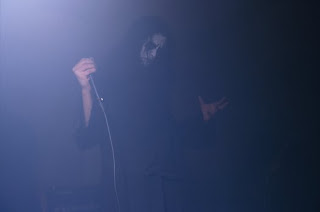 You’ve mentioned Steve Roach in interviews. How did you first discover ambient music?The Magnificent Void
You’ve mentioned Steve Roach in interviews. How did you first discover ambient music?The Magnificent Void was the album. I discovered it by someone who had made a CD-R of it for me. I had put off listening to it for a while, and then one night I was in the right time and space to truly discover it. I got the feeling that the earth was fading away, and it was the epitome of being lost in a galaxy of infinity, forever. The title fits very well. I’m not really sure how or when I discovered ambient music. I don’t categorize the non-black metal stuff I like. As long as something is atmospheric, sad or dark sounding I’ll take an interest in it.
You’ve also cited the Who and Boston as influences, both of which come across more in your production. In what ways do you feel rock comes into your music?No, I’m only a fan of their music and listen to it during times when I’m fed up with black metal. There is no influence from rock music in the music I make.
You’ve expressed anger at the music industry and the internet for exploiting black metal. How do you keep a balance between your art and business?Many bands and fans are blinded and manipulated by the music industry. Both can certainly be loyal to the wrong people! The more and more the “music industry” milks out of a band, the less and less respect and gratitude they’ll show and give to the band and in time. They’ll think they “own” the band. Supporting the music is fine, but why support the crooked labels? Does some label (if not the music) give the sheep some kind of identity? They don’t support you or the music, only themselves. Cult labels are a thing of the past. Wake up and get over it.
There are some highly respected bands in today’s scene that’ll sacrifice all their beliefs and give up their art to some businessman that does not give a shit about their music just for a few measly dollars more and, in the end, it’ll be quite a few dollars less. Hear me now, believe me later. There are labels out there that will disagree with your views and philosophy and not even listen to (or like) your music but will try and get you to sign a contract immediately. These are the same labels that will look you in the chest and not in the eye while telling you there’s no money in black metal. Meanwhile, these pricks are laughing all the way to the bank. I have seen what a joke this scene is, and I’ve had the disgust of seeing labels sign and work with bands that they’ve insulted and mocked behind their backs. I’ve witnessed labels call bands on their roster “shit.” I will and have rejected things like this once I began to encounter it. So think about that the next time you want to call me a “sellout,” as a sellout would just bite the bullet and tolerate it.

Black Metal can do just fine without this social crutch known as the internet. Few use it, many abuse it. Personally, I take care of my emails, and that’s worked well enough for me. None of this other bullshit has any meaning. No thanks to the internet, mouths and opinions have become more significant than contributions. There couldn’t be any other subculture or subgenre scene that relies on the internet as much as black metal does when it should have been relied on the least! The internet is the same thing as a television or a tabloid that gossips about movie stars, and this has no place in black metal. Yet, the bands that aren’t playing the music for themselves (or because it’s within them to do so) means that they’re doing it for this internet acceptance.
Naturally, when black metal became very big on the internet, that’s when the businessman stepped in.
The balance is a good question, there have been times, not long ago, where the business part of things felt like it was becoming a distraction and a frustration, but I made it through all that. Being on a label that’s sincere and isn’t trying to sneak something past me or rip me off gives me one less thing to stress about, and that means some more time spent focusing on the point and what matters: the music. On a more positive note, I believe a couple labels like Hydra Head and Total Holocaust Records have had my best interest in mind and seem to have a grasp on where I’m coming from.
You’ve said in the past that when you started Xasthur, you only wanted to self-release albums and not deal with labels. Why has that changed?Probably getting too caught up in the actual making of the music to have the time or patience of releasing it myself. Contrary to popular belief, I’ve never had very much money, and it takes more time and money than I could afford to release my own music. But still, looking back and even with these great excuses, I should have found a way. I should have not solely benefited others with the music since it was never their creation. As much as I hate playing the role of businessman or people person, it’s a mistake and for a while I paid for it.
Why did you decide to leave Moribund and Southern Lord?I buried the hatchet with this one already. It’s time to move on…
Are you disappointed by some of the people just discovering black metal through your music alone?No, I’m not disappointed by that. If anything, I would be fortunate if that’s really the case. If someone is new to black metal they should see that not all black metal music, structures, ideas, lyrics and people behind those things live up to the same typical stereotypes they may have had before deciding to get into it. For example, there has never been a need for me to make a song about a fucking goat, and there are different ways to express misery, hatred, evil, emptiness and darkness, but more on a personal level, personal attack and affect. No, I’m not so concerned with geographical locations; I just happen to live in the US.
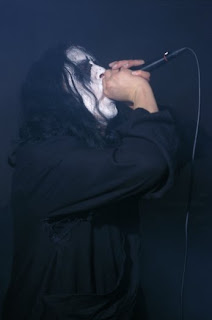 Why do you often mention mirrors in your lyrics and in interviews?
Why do you often mention mirrors in your lyrics and in interviews?I see my music as a mirror to see a horrific hidden truth within your very being, to reflect fear, to reflect weakness and ugliness within and expose denial. Mirrors are the voices in your head that you thought no one heard, but someone did. There are many human beings that can’t see themselves, and when they have the audacity to think their life means something or has worth, there are mirrors to run from that will tell otherwise and exploit mortality. Tormenting human beings with mirrors is more fatal than cracking their head open or sticking a knife in them. You could hate me for everything I’ve had to say (even in this interview), but don’t hate me, hate the mirror. The sound is a picture of what I see around me, within me and within human beings. I want depression, a void and oppression to be an experience or a soul-drain through music and more than just a word. Pride, denial and lies are another part of human nature that I despise. Mirrors can be a key to reducing human beings to NOTHING! I will leave you with nothing to idolize and show you that nothing is sacred and I want you to know the pain of what it’s like to hate everything you loved.
Your lyrics aren’t typically about time-worn subjects like Satanism. What are your views on black metal artists whose goal it is to spread the word of Satan?True, my music doesn’t spend much time dwelling on “Satan.” Some other bands who spread the word as a philosophy that they believe or have even adapted into their lives is something I can respect of course, but there are also fools who are confused and don’t know any other ways or emotions to express individuality, hatred, opposition or evil. It’s empty words and it bores me. The shock value has been lost for years and besides, a true Satanist doesn’t walk through life dressing the part.
Unfortunately, politically correct labels and listeners have made Satan and the devil something safe now and will accept these themes from a band in their music and interviews because it isn’t an offense or an attack of hatred toward specific religions, stereotypes, genders, races, wars, political stances, sexuality and most importantly, characters. Therefore the businessman doesn’t have to stand on either side of the fence, and it only equals money with no risk. Provoking an audience in other ways may not be acceptable, or… doing something different all together may not be either. Ironically, as these new “open-minded” people discover black metal, it means that black metal has to remain closed-minded by sticking to the same old thing. Go figure.
 I’ve read in interviews that you hate everything in LA. What has kept you there for so many years?
I’ve read in interviews that you hate everything in LA. What has kept you there for so many years?Basically lack of money has kept me here, not to mention, this place is sort of expensive, so it’s easy to spend more than a person can save or make. Some laziness might be a factor as well.
What do you feel people misinterpret most about you?Instead of giving a real long answer, I’ll say just about everything. Just about everything I say will be intentionally misunderstood, because there are many things people want and don’t want to believe and it’s easier for them to do this. It would crush your little world to believe me but at the same time, that’s why I’m here and that’s what the intent of this music is for me. It’s all a mindfuck, where reality is the rapist… if not yourself. Your crutch will fail you and then you’ll be lost. I think I’ve made myself clear enough here.
Thanks again for taking the time to do this interview.Thanks for the interview. I will not be doing any more of them.
For more on Xasthur, visit xasthur.mercurous.net and xasthurnews.blogspot.com.
 Christmas and heavy metal have always shared a bittersweet relationship. After all, should musicians whose sheer existence depends on the denigration of religion cop to being family folks off hours? So many have said over the years that they don't really believe their lyrics' words—that they're merely actors portraying characters (looking at you, Alice Cooper)—yet they won't lighten up their tunes. Anyway, a few artists have written Christmas songs (and anti-Christmas songs, but really what are we to believe?), and shockingly they're pretty good. So, without further ado…
Christmas and heavy metal have always shared a bittersweet relationship. After all, should musicians whose sheer existence depends on the denigration of religion cop to being family folks off hours? So many have said over the years that they don't really believe their lyrics' words—that they're merely actors portraying characters (looking at you, Alice Cooper)—yet they won't lighten up their tunes. Anyway, a few artists have written Christmas songs (and anti-Christmas songs, but really what are we to believe?), and shockingly they're pretty good. So, without further ado… Naturally, Judas Priest singer Rob Halford can write a great song about anything. Plus, I believe he really wishes he could go on a Christmas ride.
Naturally, Judas Priest singer Rob Halford can write a great song about anything. Plus, I believe he really wishes he could go on a Christmas ride.